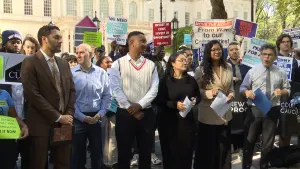More Stories
The controversial Stand Your Ground bill won't move forward this year. The General Assembly's Judiciary Committee failed to act on it, and a related proposal, before its deadline Monday afternoon.
The bill would have presumed drivers are justified in using deadly force against someone attempting to enter their vehicle, unless prosecutors could prove otherwise.
Currently
that presumption only exists inside your own home, known as the Castle
Doctrine. Stand Your Ground would
have expanded it to situations outside your home, including car thefts. The
bill would have also loosened the "duty to retreat" from a
confrontation.
Supporters argued that crime victims need added legal protection.
"I'm in my car and I'm pumping gas and, as I get into my car, someone is going to come in -- could even be a juvenile -- comes in from the other end to carjack me or to point a weapon at me," said Walt Kupson from Connecticut Citizens Defense League.
Stand Your Ground became a national debate in the George Zimmerman case. Citing Florida's self defense law, a jury acquitted him of killing Trayvon Martin, an unarmed Black teen.
Critics testified the bill isn't needed because self-defense is already allowed under state law.
"People already have the right to use deadly force if it is the only way to prevent the imminent commission of a forcible felony," said Mary Bernstein from Connecticut Against Gun Violence.
State prosecutors agreed. In written testimony, the Connecticut Division of Criminal Justice said, "Such a change in the law is unnecessary because it will have no effect. Under current law … once a defense of self-defense is raised, the state must disprove it beyond a reasonable doubt."
Prosecutors also
worried Stand Your Ground could be dangerous.
"Intended or
not, as written, this portion of the bill will effectively permit one person,
absent any perceived threat of personal or third party harm, to kill another
person merely because the person employing deadly physical force reasonably
believes that the other person is attempting, or has succeeded, with force, to
enter their unoccupied motor vehicle,” DCJ wrote.
A similar proposal for churches was also defeated.
Also on Monday, the Judiciary Committee dropped a bill limiting people to one handgun purchase a month. The measure was designed to curb
“straw purchases” for people who aren’t allowed to possess guns.
Gun owners won
another battle, too. Gov. Ned Lamont wanted to drastically expand gun control
rules, but lawmakers dropped those
provisions last week.
More from News 12
2:34

Guide: Safety tips to help prevent home burglaries
2:19

Guide: Safety measures to help prevent fires and how to escape one
2:40

Mayor's budget cuts: A controversial solution amidst immigration crisis
2:07

Tips on how to avoid confrontation with sharks while swimming in the ocean
2:33

5 tips to prevent mosquito bites and getting sick from viruses
2:39
